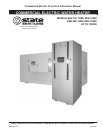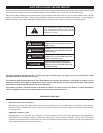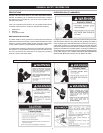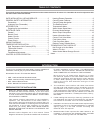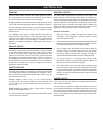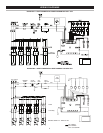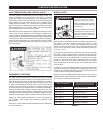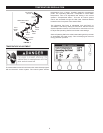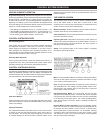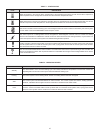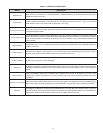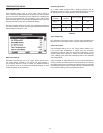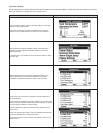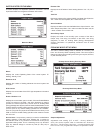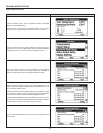
7
HIGH TEMPERATURE LIMIT CONTROLS (ECO)
This water heater is equipped with an ECO (energy cut off). This
switch is adjustable, up to 190 degree F. An ECO is a normally
closed switch that opens (activates) on a rise in temperature. If the
ECO switch contacts open (activate) due to abnormally high water
temperatures the control system will lock-out and disable further
heating element operation. It is important that a qualied service
agent be contacted to determine the reason for the ECO activation
before resetting the ECO. Once the reason has been determined
and corrected the ECO can be reset as follows:
When the ECO switch contacts open (activate) the electronic control
system locks out and displays a Fault message. Voltage to the
contactor coils and heating elements is terminated to prevent further
heating operation. Should the ECO activate, the water temperature
must drop below 120°F/49°C before the control system can be reset.
Once the water temperature has cooled below this point the power
supply to the water heater must be turned off and on again to reset
the control system.
THERMOSTAT CONTROLS
The water heaters covered in this instruction manual are equipped
with adjustable thermostat controls to control water temperature. Hot
water temperatures required for automatic dishwasher and laundry
use can cause scald burns resulting in serious personal injury and/
or death. The temperature at which injury occurs varies with the
person’s age and duration of exposure. The slower response time
of children, the elderly or disabled persons increases the hazards to
them. Never allow small children to use a hot water tap or draw their
own bath water. Never leave a child or disabled person unattended in
a bathtub or shower. The water heater should be located in an area
where the general public does not have access to set temperatures.
Setting the water heater temperatures at 120°F will reduce the
risk of scalds. Some States require settings at specic lower
temperatures.
See Figure 1 which shows the approximate time-to-burn relationship
for normal adult skin.
MIXING VALVES
DANGER
Water temperature over 125°F (52°C)
can cause severe burns instantly
resulting in severe injury or death.
Children, the elderly and the physically
or mentally disabled are at highest risk
for scald injury.
Feel water before bathing or showering.
Temperature limiting devices such as
mixing valves must be installed when
required by codes and to ensure safe
temperatures at fixtures.
Water heated to a temperature which will satisfy clothes washing,
dish washing, and other sanitizing needs can scald and cause
permanent injury upon contact. Short repeated heating cycles
caused by small hot water uses can cause temperatures at the
point of use to exceed the water heater’s temperature setting by
up to 20°F (11°C).
Some people are more likely to be permanently injured by hot water
than others. These include the elderly, children, the infirm and the
physically/mentally disabled. Figure 1 shows the approximate time-
to-burn relationship for normal adult skin. If anyone using hot water
provided by the water heater being installed fits into one of these
groups or if there is a local code or state law requiring a certain
water temperature at the point of use, then special precautions
must be taken.
In addition to using the lowest possible temperature setting that
satises the demand of the application a Mixing Valve should be
installed at the water heater (see Figure 2) or at the hot water taps
to further reduce system water temperature.
Mixing valves are available at plumbing supply stores. Consult a
Qualied Installer or Service Agency. Follow mixing valve manufacturer’s
instructions for installation of the valves.
Water Temperature
Time to Produce 2nd & 3rd
Degree Burns on Adult Skin
180°F (82°C) Nearly instantaneous
170°F (77°C) Nearly instantaneous
160°F (71°C) About 1/2 second
150°F (66°C) About 1-1/2 seconds
140°F (60°C) Less than 5 seconds
130°F (54°C) About 30 seconds
120°F (49°C) More than 5 minutes
FIGURE 1.
TEMPERATURE REGULATION



